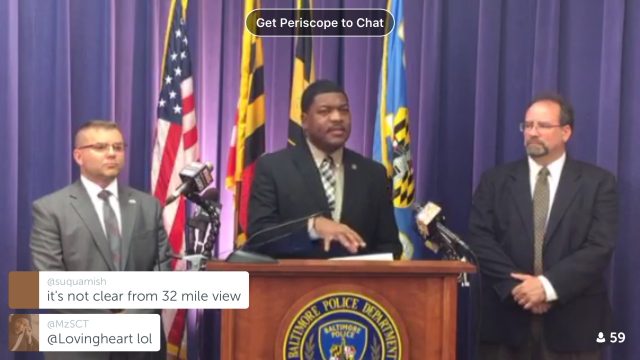![Persistent Surveillance Systems has been watching Baltimore for months [Updated]](https://cdn.arstechnica.net/wp-content/uploads/2014/07/pss.overview-640x382.jpg)
The firm, Persistent Surveillance Systems (PSS), has been actively trying to get new contracts with large cities nationwide. When Ars profiled the company in 2014, company CEO Ross McNutt said PSS was trying to work with Chicago after having controversially flown for nine days over Compton, California—adjacent to Los Angeles—in 2012.
PSS has evidently now succeeded in Baltimore. As Businessweek reported, the Baltimore project was funded by two Texan philanthropists, John and Laura Arnold, who said that if the company could find a city to partner with, they would fund it.
Eventually McNutt worked his connections with the Baltimore Police Department, which arranged for payment via something called the Baltimore Community Foundation, a local group that describes itself as a “philanthropic foundation created by and for the people of Greater Baltimore, where many donors join together to make the region they love a better place, today and for future generations.”
In January 2016, McNutt and his team opened a small office above a downtown parking garage marked with a sign that simply reads “Community Support Program.” As Businessweek noted, a former Baltimore cop acts as a liaison between the Baltimore Police Department and PSS, which receives a printout of all of the logged crimes from the previous day.
The Baltimore Community Foundation sent Ars a statement explaining that it “serves as a fiscal sponsor” for hundreds of funds that make thousands of grants per year.“In December 2015, BCF received a gift of $120,000 from the Fidelity Charitable Fund for the Baltimore Police Foundation Special Grants Fund, one of those 800 funds at BCF,” according to the statement sent by Andrew Waldman. Waldman went on to explain that the Baltimore Police Foundation Special Projects Fund then paid the same $120,000 to Persistent Surveillance Systems. “Recent payments from this fund have been used to purchase food for community events, trophies for sports teams, and items for the city police museum.”
When Ars asked Waldman whether it was appropriate for the BCF to fund a surveillance project of this magnitude, he referred us to BCF President Thomas Wilcox. Wilcox did not immediately respond. PSS itself also did not respond to Ars’ request for comment. Ars has since filed a public records request with the Baltimore Police Department to learn more about its arrangement with PSS.
The $120,000 payment came about nine months before an August 2016 report by the Department of Justice, which concluded that the Baltimore Police Department “engages in a pattern or practice of conduct that violates the Constitution or federal law.” A Baltimore PD spokesman told Ars that the department would be holding a press conference livestreamed on its Facebook page and Periscope at 3pm Eastern on Wednesday. We will update this story with any new information that becomes available.

UPDATE 3:48pm ET: At a press conference that lasted more than 30 minutes, BPD spokesman TJ Smith explained that the PSS program has "a few weeks" left in a total operation of approximately 300 hours. There was a phase of flights in January and February 2016, with another during the summer. He maintained that the goal of the program is for public safety.
"I do not want to talk to another mother on the street who is crying because her son was killed on the streets," he said.
Smith was unable to fully explain how this was disclosed to city officials or the citizenry, but he maintained that the program "is not a secret spy program—that's absolutely false."
"There was no conspiracy not to disclose it," he said.
CEO Ross McNutt, who was also present at the press conference, maintained his argument that the program is worthwhile.
"We believe we contribute significantly to the safety and support of the citizens in Baltimore," he said.
"We do have the legal analysis that covers the program. We are no different than any other law enforcement program. There are four Supreme Court precedents."
He likely was referring to the 1989 Supreme Court decision, Florida v. Riley, which found that no warrant is needed if police conduct aerial surveillance. However that case involved police in a helicopter targeting one person's alleged marijuana operation, not an entire city. That case built off of a 1986 case, California v. Ciraolo, which reached a similar conclusion.
Smith also said that a murder was reported in Baltimore on Wednesday and that the plane was grounded due to scheduled maintenance.
"We wish it were up today," he said.
reader comments
129